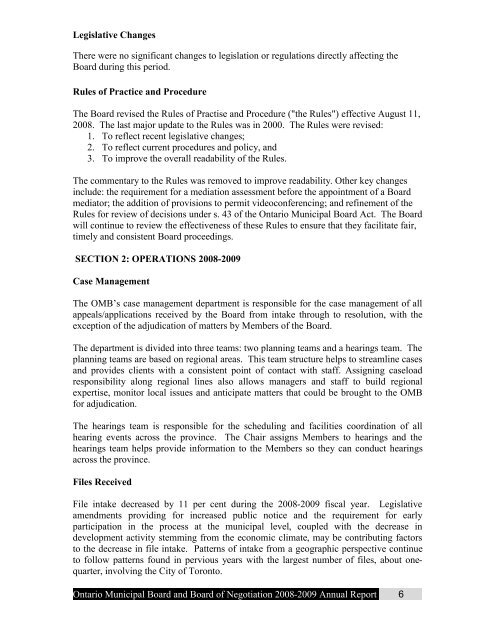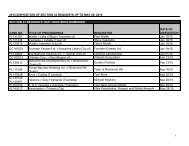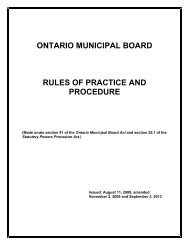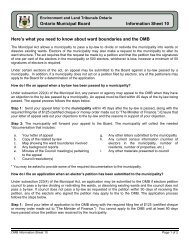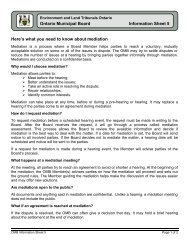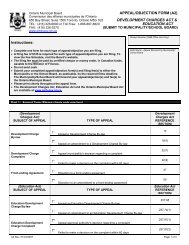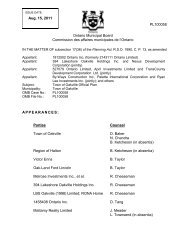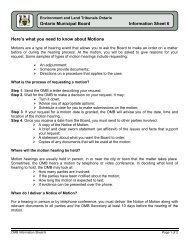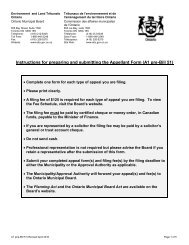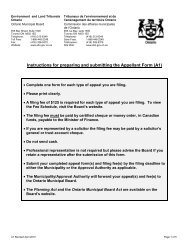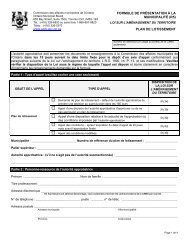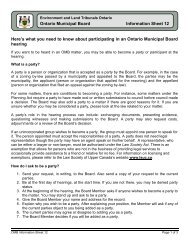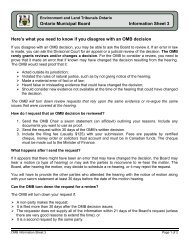2008-2009 Report - Ontario Municipal Board
2008-2009 Report - Ontario Municipal Board
2008-2009 Report - Ontario Municipal Board
You also want an ePaper? Increase the reach of your titles
YUMPU automatically turns print PDFs into web optimized ePapers that Google loves.
Legislative Changes<br />
There were no significant changes to legislation or regulations directly affecting the<br />
<strong>Board</strong> during this period.<br />
Rules of Practice and Procedure<br />
The <strong>Board</strong> revised the Rules of Practise and Procedure ("the Rules") effective August 11,<br />
<strong>2008</strong>. The last major update to the Rules was in 2000. The Rules were revised:<br />
1. To reflect recent legislative changes;<br />
2. To reflect current procedures and policy, and<br />
3. To improve the overall readability of the Rules.<br />
The commentary to the Rules was removed to improve readability. Other key changes<br />
include: the requirement for a mediation assessment before the appointment of a <strong>Board</strong><br />
mediator; the addition of provisions to permit videoconferencing; and refinement of the<br />
Rules for review of decisions under s. 43 of the <strong>Ontario</strong> <strong>Municipal</strong> <strong>Board</strong> Act. The <strong>Board</strong><br />
will continue to review the effectiveness of these Rules to ensure that they facilitate fair,<br />
timely and consistent <strong>Board</strong> proceedings.<br />
SECTION 2: OPERATIONS <strong>2008</strong>-<strong>2009</strong><br />
Case Management<br />
The OMB’s case management department is responsible for the case management of all<br />
appeals/applications received by the <strong>Board</strong> from intake through to resolution, with the<br />
exception of the adjudication of matters by Members of the <strong>Board</strong>.<br />
The department is divided into three teams: two planning teams and a hearings team. The<br />
planning teams are based on regional areas. This team structure helps to streamline cases<br />
and provides clients with a consistent point of contact with staff. Assigning caseload<br />
responsibility along regional lines also allows managers and staff to build regional<br />
expertise, monitor local issues and anticipate matters that could be brought to the OMB<br />
for adjudication.<br />
The hearings team is responsible for the scheduling and facilities coordination of all<br />
hearing events across the province. The Chair assigns Members to hearings and the<br />
hearings team helps provide information to the Members so they can conduct hearings<br />
across the province.<br />
Files Received<br />
File intake decreased by 11 per cent during the <strong>2008</strong>-<strong>2009</strong> fiscal year. Legislative<br />
amendments providing for increased public notice and the requirement for early<br />
participation in the process at the municipal level, coupled with the decrease in<br />
development activity stemming from the economic climate, may be contributing factors<br />
to the decrease in file intake. Patterns of intake from a geographic perspective continue<br />
to follow patterns found in pervious years with the largest number of files, about onequarter,<br />
involving the City of Toronto.<br />
<strong>Ontario</strong> <strong>Municipal</strong> <strong>Board</strong> and <strong>Board</strong> of Negotiation 6 <strong>2008</strong>-<strong>2009</strong> Annual <strong>Report</strong> 6


